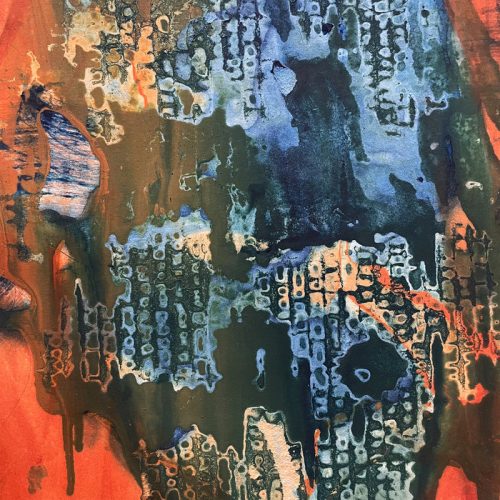The music of Jeremy Ratib is hard to describe – I wasn’t familiar with their songs before listening to “The Great American Dusk.” The lyrics of all the songs on We, Sacred are a bit tough to parse, increasingly so from the leading song “Salt of a Dream”, but “The Great American Dusk” descends into surreal imagery alongside an odd cadence. However, not once did it ever lose its beauty: It’s an undeniably pretty song.
Even if you weren’t a native English speaker, and the lyrics were only sounds, the cadence and flow between words to words and then lines to lines have a sonic beauty all their own. I find it most beautiful during the final bridge: I don’t see his eyes / can’t see his eyes / I don’t see his eyes / can’t see his eyes / don’t see the light. The mantra mixes well with the guitar and backup singing, and it feels like the ends of each line link to the next so fluidly. Each of the verses also sport a unique cadence; the first two lines are longer and juxtapose the shorter two final lines. It sounds similar to a limerick, though always lacking the final longer line. However, the two opening verses lack this, instead being stacked, two-line call and response style verses. For a lack of a better word, It sounds acutely poetic. Even without a meaning to the lyrics, it’s beautiful and captivating to listen to, while feeling distinctly dusty and dark.
There’s an element of sadness in how the strings of “The Great American Dusk” sound. During the outro, the male lead gives us this gentle and drawn out “I’ll wait”, while a female vocalist enters at the end of his line, repeating “dreams of nothing”. She sounds tender but sad, or perhaps pitying. Without understanding the lyrics, there’s a smothering melancholy that sticks with the listener. While understanding them, the lyrics feel oddly post apocalyptic. They are surreal and strange, and not all the verses are directly readable, with adjectives placed in strange spots that serve to prop up the sonic enjoyment of the line. The visuals from the lyrics are dark without being explicitly morbid, and exist in a strange, dark and dreamy space. There is a lot that is hinted at with the lyrics, with nothing being explicitly said. It’s something that I hardly feel confident in interpreting, as many meanings could be derived from Ratib’s lyrics.
That’s the primary reason I’ve talked about “The Great American Dusk” the way that I have: It’s undoubtedly a surreal work that flourishes when the listener arrives at their own conclusions. It’s easy to talk about the moods or sounds of the work, but a greater meaning seems much more intimate. All the music on We, Sacred has elements of this, though none as abstract as “The Great American Dusk.” I adore what this album is going for, and easily recommend this and the rest of Ratib’s music.







